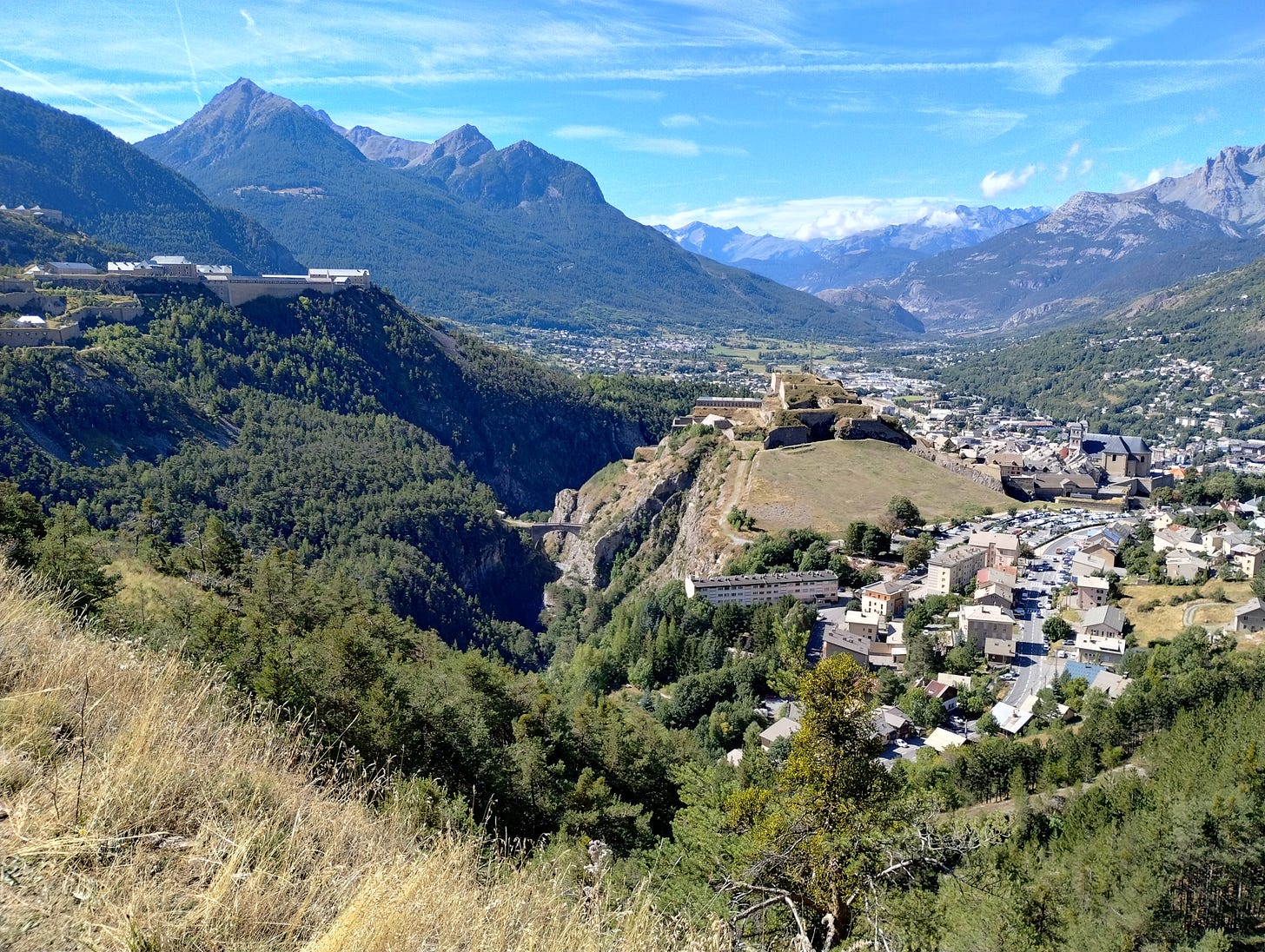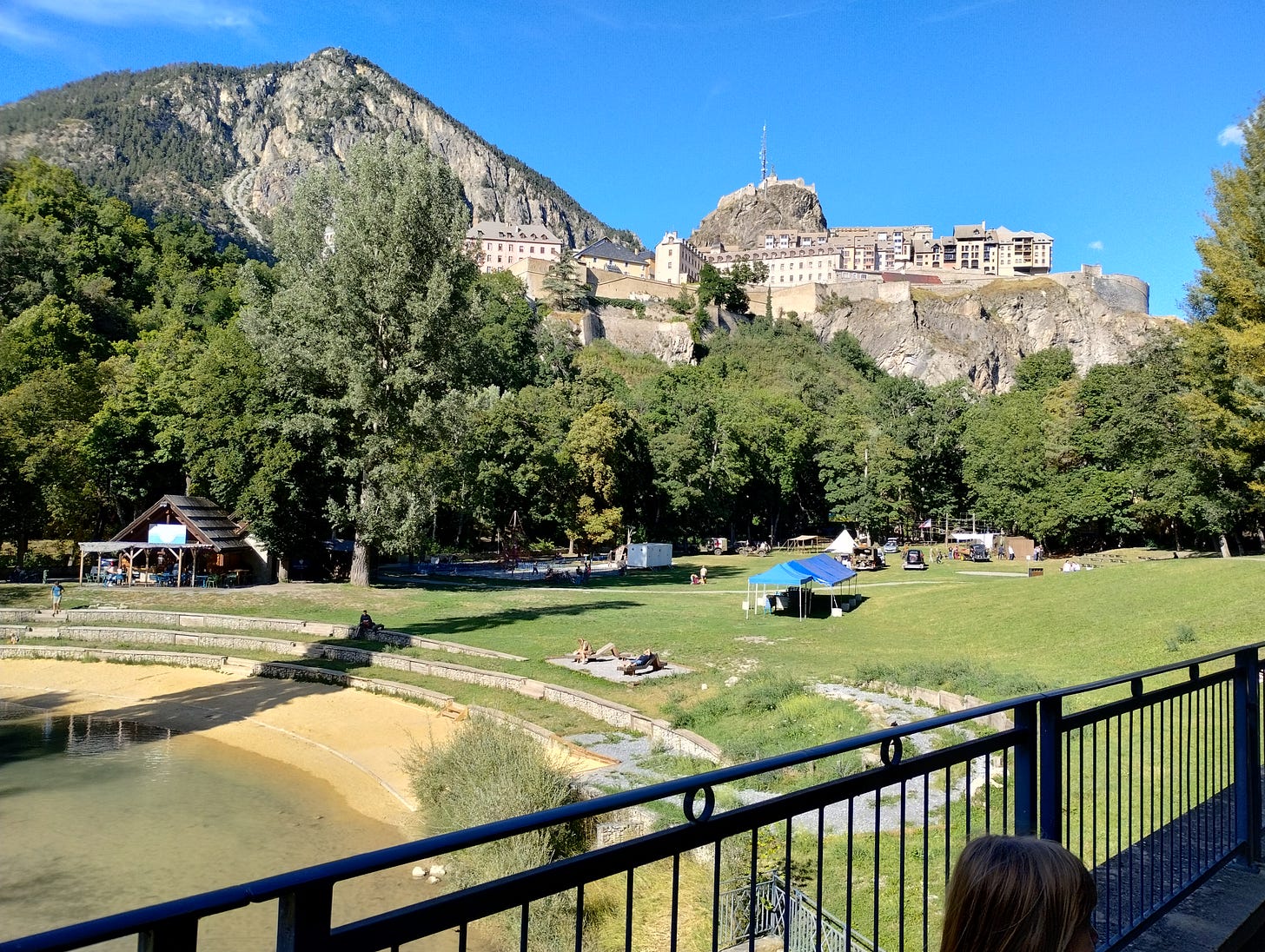Walking in Briancon
Dispatch from the ambulatory school of the French Alps
Small shops crowded the hillside across the road with one lane running in either direction. Above them were houses, and above those, thick trees took the slope up and up to the distant top of the mountain. On the nearer side of the road, the mountain fell into miles of valley scattered with steeples and waterfalls hiding in the rocks.
We crossed the road to the higher side and spent several minutes by a fountain positioned outside the public bathrooms. Just a few days before, I had broken my toe. This fact made the hike we had planned that perfectly clear and cool morning much more enjoyable since it was now something I insisted upon rather than simply did. Never neglect the intricate pleasures attending upon malady and accident. Concluding our errand at the fountain, we gathered ourselves for the climb to the fortress and, beyond it, to the Croix de Toulouse.
The way up started as a lane between little houses, apartments, and garages. Corners of buildings studded with convex traffic mirrors jutted into the lane at flamboyant angles requiring passing vehicles to accordion around the bends dodging masonry, charming wooden shutters, and limping pedestrians as they went. Soon enough the lane turned to trail and the houses to trees. The masonry did not turn to anything, it simply disassembled itself into rocks.
This was an alpine landscape in late summer, early autumn, and in gaps between the evergreens were huge spans of air across the valley. Hawks coasted the thermals and lizards skittered over rocks and away from us as we passed.
Some of us, dynamos of boundless energy and ambition in the safety of four walls and a roof, decided that the trail ahead lead through a vale of tears through which it would be best to be carried. It was only upon reaching this decision, I think, that the children realized the full tactical advantage I enjoyed with my broken toe. With something like grudging admiration for the player and disgust for the game, the little one resigned herself to trudging glumly beside me up the mountain, all hopes for a ride on my back dashed by the wayward toe.
We arrived at the fort and found it perched on an outcrop of stone overlooking the valley. Its entrance was chained shut and locked. Because we could not enter the fort and thereby plan its defense, we were forced to the other side of an imaginary battle and contemplated just how easy it would be for us to infiltrate and overthrow the woefully inadequate defenses. In the end, that particular fortress was probably saved from certain defeat by one broken toe. How often does history twist in such a wind?
We continued our ascent.
By late morning our little crew was on the brink of deciding that we had slipped from the mere vale of tears and fallen upwards, headlong into an alpine inferno, when teenagers began to pass us from the opposite direction. At first there were ones and twos who smiled and offered the cheerful kind of greeting always administered by those descending a mountain to those still ascending it. This trickle of teenaged humanity turned into a downpour and we settled in by the side of the narrow trail to wait for the now human deluge to pass.
“Bonjour madame et monsieur,” — “Bonjour,” came thick and fast in the charming, sing-song tones with which the French greet one another. Ten teenagers in a group passed with another twenty just behind them, then more and more mostly clumped together into little klatches and conversations as they made their way down the mountain. We began to piece together what we were witnessing when a small group of three passed us by who were ten to twenty years older than the adolescents. These were teachers! Those were students! This was a school!
“Bon courage, c’est que la debut”—“take courage, this is just the start,” quipped with a twinkle in his eye the hundredth young person who passed us. We weren’t sure if he was describing the trail ahead of us or the stream of students behind him.
Having been “in education” for some years myself, I observed with some interest the relative disinterest with which the occasional groups of teachers, invariably engaged in conversations among themselves, regarded the students churning before and behind them on their way down. The students talked among themselves or were silent. And rather than hectoring — excuse me — lecturing or mentoring the students on their morning hike, the teachers were content to enjoy the mountain themselves. Their own conversations simply the walking, talking, ambulatory palaver of friends, colleagues, and countrymen.
Perched on the side of the trail as we were, some teachers and students would occasionally recognize that it would take some time for their group to pass by, and offered cheerful, apologetic updates as to how much of the group was left to come. For our part, the children were happy for the reprieve from our Bataan-like death march up the mountain, and my wife and I were perfectly content to take in the warm morning sunshine, the rocks and trees, and all the clear-eyed young people and their benevolent faculty passing by us.
A final cluster of teachers saw us, realized that we must have been delayed by their group some fifteen minutes or so, saw also that we were in good spirits about the encounter, and announced with—if you can imagine this—an apologetic flourish like a tardy usher inviting us further up the mountain: “C’est fini!”
I tell you all of this so that you know there is a small city in the French alps with staggering views of mountains, glaciers, waterfalls, and steeples; that through the city, crisscrossed by pedestrian bridges, runs a boisterous and frigid river; and that a school in this city, through a rare and delightful conspiracy of common sense, spent several hours on a school day, students and faculty alike, walking in the mountains.
I thought you should know.






Lovely writing. I so appreciate the reminder that any time spent outdoors, hiking with friends, is a good use of time.
I hope you made it to the top.